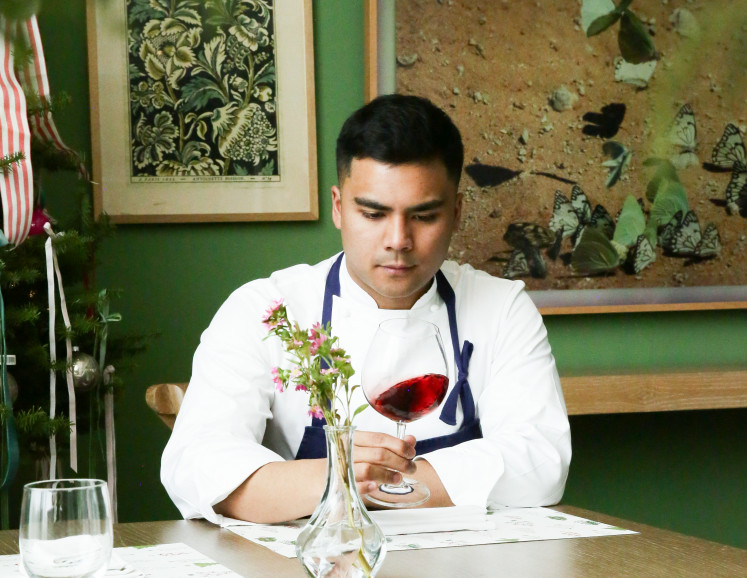Popular Reads
Top Results
Can't find what you're looking for?
View all search resultsPopular Reads
Top Results
Can't find what you're looking for?
View all search resultsEssay: Escape
Sadly, there was never room for my family at the top of the starfruit tree.
Change text size
Gift Premium Articles
to Anyone
T
wo nights before I left Indonesia for the States, my parents, three sisters, one brother and a few of my nephews spent the night with me at an old hotel in Jakarta. We only had two rooms, but managed to squeeze everyone in. My nephews loved staying at a hotel. It gave them a completely different environment, especially if there’s a breakfast buffet. Caring for their auntie who was leaving the country was not the reason: the all-you-can-eat breakfast was what sealed the deal.
It was after midnight and my sisters were talking in hushed tones with our mother. I was pretending to be asleep. In less than 48 hours, I’d be flying to a new life in the States. Everything had been said, at least for my part. I’d closed my eyes, hoping they would call it a night.
“Is she asleep?” I heard my mother say.
“Yes,” my eldest sister replied.
“I can’t sleep. My baby is leaving for God knows how long. She’s not even letting us drop her off at the airport. Doesn’t she love us?”
I should have told her then, that wasn’t true. But it didn’t even bother me.
“Maybe she doesn’t like saying goodbye,” said my other sister.
“What if he’s some crazy bule?” my mother blurted out.
Bule is Indonesian slang for white-skinned foreigners. My mom’s concern was reasonable. They had never met my man. I couldn’t tell them that I was searching for an escape from my life of culturally imposed limitations.
They were still talking when I finally fell asleep, after I heard one of them say, “She’ll run home if it doesn’t work out. Don’t worry too much.”
The next day, they left me at the hotel. I stood alone on the footpath and watched them, in a Kijang, slowly become a part of the tide of Jakarta traffic. I shed a few tears, then went off to my room to pack my things. I found my nephew’s used toothbrush on the wet bathroom floor. I left it untouched and sat down on the toilet. Looking around the suddenly empty room, I felt tears coming down. I pushed my elbows into my thighs, my face buried in my hands, and bawled for 15 minutes.
I checked out, then took a cab to another hotel that my man had booked for me. It was a five-star hotel nearby. I didn’t take my family there because I was worried we’d be caught sneaking too many people into my room. But suddenly I wished that I had crammed them all into the five-star hotel room, treated my nephews to the breakfast buffet of their lives, left the bathroom covered in water with footprints on the toilet seat and a kid’s toothbrush on the floor.
Most of all, I wished I had told my mother that I was scared.
***
My mother kept telling me that no boy would ever want to marry me. Good thing, that made me study even harder. I found myself competing with the smartest boys at school. Every year, I came in second place, sometimes in first place. Back then, they mercilessly ranked the kids by number. I often wondered how child number 50 felt.
My childhood school was located across the street from my parents’ house. The Catholic school, with its own church, instilled in me a deep fear of being a bad girl. From my bedroom, I could hear the school bell ring. The kids would walk fast, neat in their uniforms: white shirts with tiny ties, and red shorts or skirts. The boys wore their hair very short, the girls sported ponytails. Our white shirts were never white. You could always smell dry dirt mixed with sun-warmed sweat coming from every kid.
Sitting in the starfruit tree in front of my family home in Palembang was an uncomfortable, restless business. The tropical heat raised a light sweat on my skinny-girl’s legs. The hard wood of my favorite tree made a bumpy but secure perch, twisting and writhing beneath me before cutting deeply into the black soil. Earthy smells of death, life and ancestors. Tree roots, my roots.
Even then, before I hit my teens, I felt the sting of the trap that was my gender. I was born a disappointment and was expected to grow into the role. My lack of a penis had already relegated me to the shadows: the shadows of my tree, the shadows of the family, the shadows of my community and the deep shadows of my nation. My surroundings did nothing to lighten these shadows. Flower power, women’s rights, free love and equal opportunities were not part of the mantra.
I saw my father as an old man with a pride he could no longer afford. His influence and affluence went with the monetary crisis. The grand old man had been made small by circumstances beyond his control. But he still had one thing he could control: his family. As a Batak, my father believed that sons were more precious than daughters. Sons carried his name; daughters would be taken away by husbands. My father saw his only salvation in his sons. Expectations were all he had.
When my father’s business failed, he suffered. My mom drove herself to become an entrepreneur: she lent money to anyone in need and took the interest as profit. She is a devout Christian, and this was against her beliefs, but she did it anyway.
I remember when I was very little, my mother once took me to some lady’s house to pick up the money she had lent to her. We waited and waited for her outside the house, but she didn’t show up. I was bored to death, so I climbed a guava tree in the front yard.
The tree had lots of fruit; some were very ripe and they fell to the ground. I told my mom if the lady didn’t come, I would pick all the guavas from the tree and sell them at the wet market near our house. She just smiled, but I could tell she was exhausted. I picked the biggest and juiciest guava I could find for her. It was the best guava she ever had: the skin was yellow, soft and fragrant, the pulp was deep pink and super sweet.
That day, we went home empty-handed and I got a stomachache. I was so mad at the lady because I ate too many guavas. I didn’t even bring any home because I was so sick of eating them.
Something happened over time. My own intelligence shined through the hard times. I tried to stick with tradition, but cried quietly because I was not spared the burden of my knowledge. The unlovely skinny little girl — the last of 10 — became the only one who could see it all with unadorned clarity. So I ran.
***
I now find myself lost in a strange world and a foreign culture. I squeezed myself out of the cage of centuries of tradition only to find myself faced with the perils of the unknown and the mysterious traditions of others. I learned to love the idea that my children have the face of their heritage, but a taste for hotdogs and cheese burgers.
And I can love the simple fact that each of my adorable children is a girl. As I face the harsh world of America, I still know that the cage door is open behind me. I can always run home. But I won’t.
Every time I think about giving up, I suddenly feel like I’m at the top of the starfruit tree in my childhood home. Mother is looking up at me with a mix of anger, fear and despair.
“Come down now, you little monkey. It’s too high. You’ll fall and kill yourself.” I look down at her frightened face. A mirage of my future: barefoot, grey and old beyond her years. The vision clears my own dizzying fear in an instant. I climb on, determined to reach the top.
Sadly, there was never room for my family at the top of the starfruit tree.
***
Uly Siregar is an Indonesian writer and journalist. She lives in Arizona with her husband and children.











